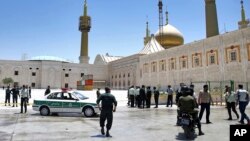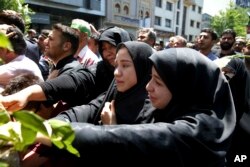Islamic State is seeking to radicalize disaffected ethnic minorities in majority Shi'ite Iran to encourage attacks intended to avenge Tehran's offensive against the group across the Middle East.
Sunni Islamic State, in decline in Iraq and Syria, claimed responsibility for an unprecedented attack on June 7 in which suicide bombers and gunmen attacked the Iranian parliament and Ayatollah Khomeini's mausoleum in Tehran, killing 18 people. The attackers were Kurdish Iranian Sunnis.
In interviews, dissidents and representatives of Iran's minority Kurds, Baluchs and Arabs said that decades-old liberation movements are evolving into sectarian-tinged struggles, spurred on by geopolitical rivalries in the region.
They told Reuters some Iranian separatist groups, several of which have pursued armed insurgencies for their nationalist or civil movements, increasingly see themselves as part of a struggle between Sunnis and Shi'ites in the region.
Some activists side with Shi'ite Iran’s increasingly assertive rival, Sunni Saudi Arabia, to show their anger against what they see as oppression by the Iranian theocratic state, in which up to 10 percent of the population is Sunni.
Other radicalized Iranians go even further by joining al-Qaida and Islamic State, enemies of both Iran and Saudi Arabia, to wage war on Shi'ites on the battlefield.
The Irbil-based head of the Kurdistan Democratic Party of Iran (KDPI) - a secular armed group which launches periodic attacks into Iran - said religious extremism was rapidly gaining traction among "emotional, poorly educated youths."
"If the Islamic Republic of Iran does not change its policies towards Sunni Muslims in Iran and in the region, more people will be inclined to organizations like Daesh," Mustafa Hijri said, using the Arabic acronym for Islamic State.
The Iranian government declined to comment. Sunni militant groups have long carried out periodic attacks on military and civilian targets, in protest against what they say is discrimination against Iran's Arab minority and Sunni ethnic groups. Iran stepped up its crackdown against members of such networks in recent years, with arrests and death sentences.
Threatening video
On August 9, IS issued a video threatening new attacks in Iran and calling on young Iranians to rise up and launch jihad in their country.
The group has often showcased its global reach by airing testimonials from its polyglot foreign followers online.
But its heaviest propaganda swipe at Iran came with a 40-minute documentary in March which attacked Supreme Leader Ayatollah Ali Khamenei as a friend of the West and featured Baluchi, Persian and Ahwazi fighters urging attacks inside Iran.
The video was released as Iranian-backed Iraqi forces and militias recaptured major areas from Islamic State territory in Iraq and Syria.
"We tell you, O Zoroastrian apostates," said a fighter called Abu Mujahid al-Baluchi, naming Iran's pre-Islamic faith.
"Our hands won't be far from you. As you tasted our strength in Iraq and the Levant, by God's will we will conquer Persia and make it Sunni."
After the Tehran attack, Iran was quick to blame Saudi Arabia, pointing to a statement by Crown Prince Mohammad bin Salman in May that the kingdom would make sure any future struggle between the two countries "is waged in Iran".
Tehran offered no evidence to back up its charge, and Riyadh denied the accusation. Reacting to the Tehran assault, the kingdom said it condemned terrorist attacks everywhere.
Iran has arrested at least 100 people linked to IS since the attack. Critics say the Iranian government has used the June attack in Tehran to crack down on minorities. The government declined to comment.
Earlier this month, the Iranian state news agency said that security forces had broken up a group linked to Islamic State which was planning attacks on religious centers.
Intelligence ministry agents arrested "a terrorist group linked to Daesh [Islamic State] that intended to carry out terror operations in religious cities," IRNA said. They were trying to bring weapons and ammunition into Iran and 27 people were arrested, it added.
Days earlier, Iranian media said Iran's Revolutionary Guards had killed two people in clashes with a group of militants in the northwest of the country, where shootouts with Iranian Kurdish militant groups based in Iraq are common.
In June, Iran announced the arrests of members of a group linked to Islamic State which was planning suicide attacks. It did not elaborate.
Anti-government Kurdish activists told Reuters that authorities for years tolerated Salafi preachers and militants linked to al-Qaida on condition that they shunt their violence beyond Iran's borders towards Americans in Iraq and Afghanistan.
"Forces linked to Daesh were publicly collecting money in some mosques in Iranian Kurdistan and the regime was clearly turning a blind eye to these actions," Hijri of the KDPI said. Iran's Interior Ministry declined to comment.
Iranian Arabs
Mokhtar Hooshmand, a Kurdish activist jailed in Iran on national security charges from 2010 to 2012, described the rise of Sunni militants in Kurdish areas and meeting dozens of the militants behind bars.
"They started preaching in 2004 in mosques. They made no secret of forming morality enforcement squads, attacking female hairdressing shops, weddings and cafes."
"Many Iranians have joined IS, have been trained in Syria or Iraq and are now back in the country. Daesh has influence in all Sunni provinces of Iran," he added. Reuters could not independently verify his statements.
Apart from Kurdish regions, potential flashpoints center on Sunni Baluchis or residents of the poor area of Sistan-Baluchestan in Iran's southeast, and ethnic Arabs of oil-rich southwestern Khuzestan province.
Minorities in Iran say they are deprived of decent living standards and civil rights.
While majority Shi'ite, many Arabs of the area they call Ahwaz see themselves as under Persian occupation. Their struggle for independence or autonomy has taken on a religious bent.
Iran has accused Saudi Arabia of providing material or financial support to Ahwazi militants, a charge denied by the Saudi government. Some privately-owned Gulf religious TV networks have advocated the Ahwazi cause.
"In Ahwaz, thousands of Shi'ites have converted to Sunni Islam after 2005, but not all to extremist Sunni groups like al-Qaida," said Mohammed Majid Ahwazi, a political activist and journalist in Sweden, who was also jailed in Iran for two years for dissent.
"Before the Syrian crisis, Arab countries were indifferent to the internal affairs of Iran," he said, adding: "But after the Syrian crisis, Bahrain unrest, war in Yemen and the presence of the Revolutionary Guards in Iraq - Arab countries have put Ahwaz, Baluchestan and the Kurds issue on their agenda.”






